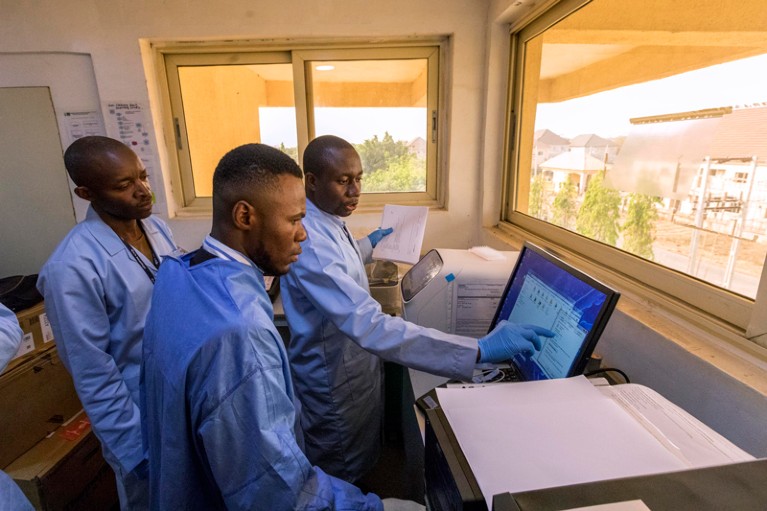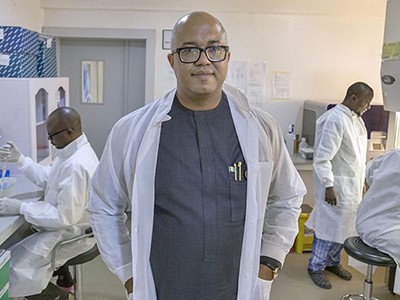
Researchers at the Nigeria Centre for Disease Control in Abuja, which is helping to shape the priorities of international scientists working in the country.Credit: Andrew Esiebo
In 2005, the world’s nations made an unprecedented pledge to fight disease. Realizing how strongly they are all connected, 196 countries promised at the World Health Assembly in Geneva, Switzerland, to work together to strengthen each nation’s ability to detect, report and respond to infectious-disease outbreaks that can rip around the globe.
Unfortunately, the initiative limped along for a decade with scant funding and political will. Then the Ebola crisis of 2014–16 made glaringly obvious how urgent the matter was. Sierra Leone, Guinea and Liberia lacked agencies capable of responding alone. The outbreak rapidly spiralled out of control, with massive human and financial costs.
The fallout encouraged some African leaders to prioritize public health. International funders began supporting the development of African surveillance and response systems. Since 2016, the World Bank has put US$381 million towards the cause in 11 West African countries.
This Nigerian doctor might just prevent the next deadly pandemic
But building sustainable, accountable public-health institutions takes more than money. It requires strong leadership and buy-in from politicians and the public. Countries including Nigeria, Ethiopia and Uganda have made impressive progress over the past few years by bolstering their public-health agencies and increasing surveillance in remote regions. Nigeria is crucial, because the nation is massive — roughly one in five people in sub-Saharan Africa is Nigerian — and the country is riddled with outbreaks that could crash Africa’s economy and spread worldwide. In a News Feature this week, a profile of the Nigeria Centre for Disease Control (NCDC) in Abuja, and its director-general, Chikwe Ihekweazu, highlights the fresh energy and strategy the country is applying to fight infectious disease.
The NCDC’s approach to research is also assertive and pioneering. The agency is helping to shape the priorities of international scientists who wish to conduct research in Nigeria. This can mean pushing back against flashy academic studies in favour of meeting basic, pressing needs. Sequencing pathogen genomes and trialling diagnostic tests are indisputably important, but not when health-care workers are too overburdened in an outbreak to save lives, never mind carefully process blood and stool samples and ship them to labs.
When studies do proceed, the NCDC frequently requests authorship on publications: if a Nigerian technician collects and processes blood samples at a hospital for a study, the agency wants that person’s labour acknowledged. Ihekweazu has also asked international collaborators to contribute roughly 10% of their grants to overhead costs, such as salary boosts for low-paid local researchers working overtime on a project, or fuel for generators at a clinical study site. Finally, NCDC staff members partner with visiting researchers, so they can learn the methods and technologies. In exchange, foreign scientists get to consult with local ones who understand the disease in its context.
Funders of biomedical research, such as the Bill & Melinda Gates Foundation and the UK Wellcome Trust, should help grant recipients to meet such demands more often. If international funders and scientists aren’t helping to advance research systems in regions hit by the diseases they study, then the justification for their projects rings a little flat.
When crises do happen, local scientists are best placed to launch clinical trials rapidly. And scientists living near sites that are prone to still-elusive diseases, such as Lassa fever, will ask the smartest questions about how they emerge and spread. Supporting African-led research is good for science, good for Africa and good for the entire world.

 This Nigerian doctor might just prevent the next deadly pandemic
This Nigerian doctor might just prevent the next deadly pandemic
 African scientists call for more control of their continent’s genomic data
African scientists call for more control of their continent’s genomic data
 Deadly Lassa-fever outbreak tests Nigeria’s revamped health agency
Deadly Lassa-fever outbreak tests Nigeria’s revamped health agency
 How to beat the next Ebola
How to beat the next Ebola
 Build the Ebola database in Africa
Build the Ebola database in Africa






